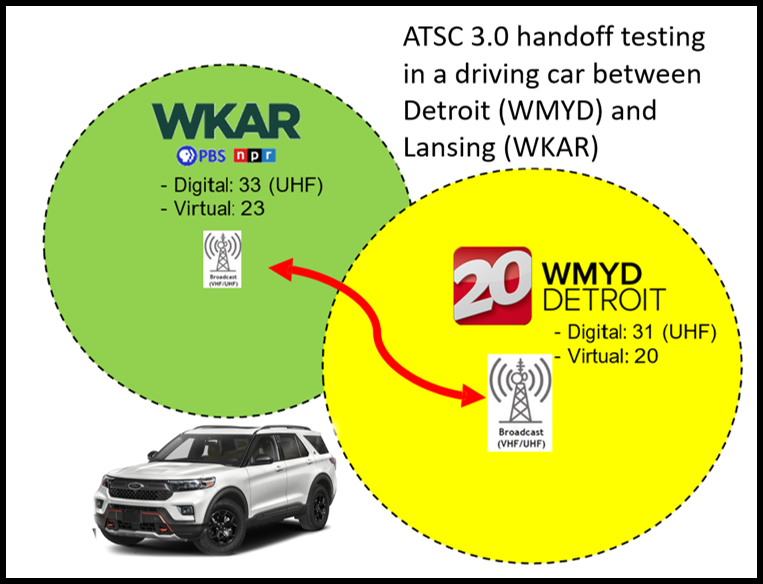NextGen TV Test Demonstrates Successful 3.0 Handoff Between Stations In Adjacent Markets
A special DigiCap DigiCaster 3.0 gateway installed at two stations enabled the handoff

DETROIT—For an in-vehicle ATSC 3.0 entertainment experience to remain uninterrupted as a car or truck travels from the coverage area of one station to another, there needs to be successful hand off between the two stations much as a cell phone network provides for calls to remain uninterrupted as people move from one cell to the next.
A test conducted in November 2021 demonstrated the viability of this handoff during a test involving a version of DigiCap’s DigiCaster 3.0 gateway installed at two participating television stations, WKAR TV, the Michigan State University public media station in East Lansing, and WMYD, The E.W. Scripps Company TV station in Detroit, the company revealed today.
In the test car, LG Electronics installed a system to receive and display ATSC 3.0 signals on a rear-seat entertainment TV. As the car traveled from the signal coverage of one TV station to the next, the handoff technology succeeded in keeping a steady TV signal on the receiver device, it said.
“The success of the demonstration is meaningful as it shows that both entertainment and data services in moving cars can be commercialized," said Yeongho Je, director of C&M Standard LAB at LG Electronics.
Heartland Video Systems installed and configured servers and installed the DigiCasters at both stations.
“Achieving seamless data hand off between the signals of adjacent ATSC 3.0 TV stations is foundational for any datacasting application in the automotive and mobile fields,” said Anne Schelle, managing director at Pearl TV. “While data handoff technology is not new, confirming a successful test of this technology for use with ATSC 3.0 spectrum is an important step forward.”
Get the TV Tech Newsletter
The professional video industry's #1 source for news, trends and product and tech information. Sign up below.
Phil Kurz is a contributing editor to TV Tech. He has written about TV and video technology for more than 30 years and served as editor of three leading industry magazines. He earned a Bachelor of Journalism and a Master’s Degree in Journalism from the University of Missouri-Columbia School of Journalism.

